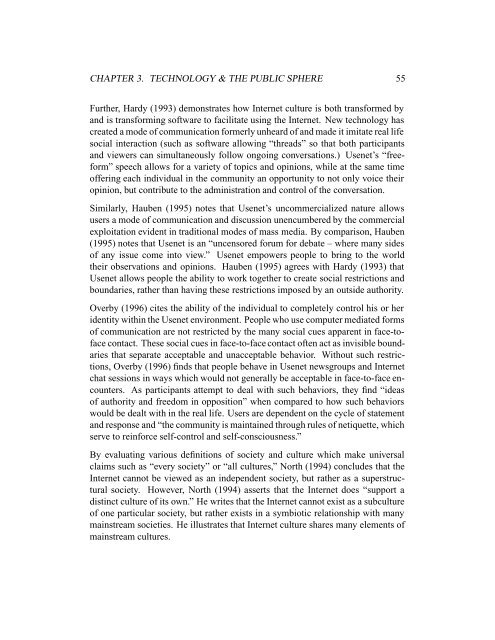Expanding the Public Sphere through Computer ... - ResearchGate
Expanding the Public Sphere through Computer ... - ResearchGate
Expanding the Public Sphere through Computer ... - ResearchGate
Create successful ePaper yourself
Turn your PDF publications into a flip-book with our unique Google optimized e-Paper software.
CHAPTER 3. TECHNOLOGY & THE PUBLIC SPHERE 55<br />
Fur<strong>the</strong>r, Hardy (1993) demonstrates how Internet culture is both transformed by<br />
and is transforming software to facilitate using <strong>the</strong> Internet. New technology has<br />
created a mode of communication formerly unheard of and made it imitate real life<br />
social interaction (such as software allowing “threads” so that both participants<br />
and viewers can simultaneously follow ongoing conversations.) Usenet’s “freeform”<br />
speech allows for a variety of topics and opinions, while at <strong>the</strong> same time<br />
offering each individual in <strong>the</strong> community an opportunity to not only voice <strong>the</strong>ir<br />
opinion, but contribute to <strong>the</strong> administration and control of <strong>the</strong> conversation.<br />
Similarly, Hauben (1995) notes that Usenet’s uncommercialized nature allows<br />
users a mode of communication and discussion unencumbered by <strong>the</strong> commercial<br />
exploitation evident in traditional modes of mass media. By comparison, Hauben<br />
(1995) notes that Usenet is an “uncensored forum for debate – where many sides<br />
of any issue come into view.” Usenet empowers people to bring to <strong>the</strong> world<br />
<strong>the</strong>ir observations and opinions. Hauben (1995) agrees with Hardy (1993) that<br />
Usenet allows people <strong>the</strong> ability to work toge<strong>the</strong>r to create social restrictions and<br />
boundaries, ra<strong>the</strong>r than having <strong>the</strong>se restrictions imposed by an outside authority.<br />
Overby (1996) cites <strong>the</strong> ability of <strong>the</strong> individual to completely control his or her<br />
identity within <strong>the</strong> Usenet environment. People who use computer mediated forms<br />
of communication are not restricted by <strong>the</strong> many social cues apparent in face-toface<br />
contact. These social cues in face-to-face contact often act as invisible boundaries<br />
that separate acceptable and unacceptable behavior. Without such restrictions,<br />
Overby (1996) finds that people behave in Usenet newsgroups and Internet<br />
chat sessions in ways which would not generally be acceptable in face-to-face encounters.<br />
As participants attempt to deal with such behaviors, <strong>the</strong>y find “ideas<br />
of authority and freedom in opposition” when compared to how such behaviors<br />
would be dealt with in <strong>the</strong> real life. Users are dependent on <strong>the</strong> cycle of statement<br />
and response and “<strong>the</strong> community is maintained <strong>through</strong> rules of netiquette, which<br />
serve to reinforce self-control and self-consciousness.”<br />
By evaluating various definitions of society and culture which make universal<br />
claims such as “every society” or “all cultures,” North (1994) concludes that <strong>the</strong><br />
Internet cannot be viewed as an independent society, but ra<strong>the</strong>r as a superstructural<br />
society. However, North (1994) asserts that <strong>the</strong> Internet does “support a<br />
distinct culture of its own.” He writes that <strong>the</strong> Internet cannot exist as a subculture<br />
of one particular society, but ra<strong>the</strong>r exists in a symbiotic relationship with many<br />
mainstream societies. He illustrates that Internet culture shares many elements of<br />
mainstream cultures.
















